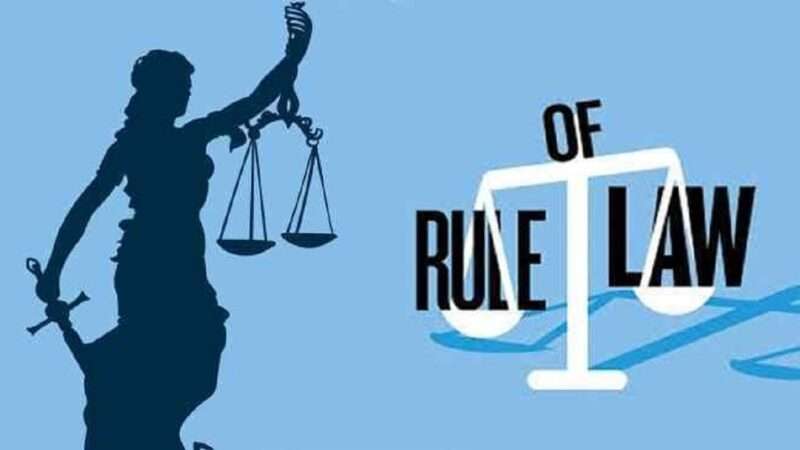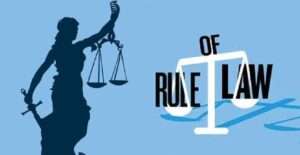The Difference Between Justice and the Rule of Law


In the course of an interview mostly devoted to other issues, a Japanese reporter recently asked me whether there is a difference between justice and the rule of law. Some of his (understandable) confusion was purely linguistic. Both “justice” and “rule of law”are fuzzy terms that different people use in different ways. It’s easy to see how non-native English speakers could get confused.
Nonetheless, there are differences between the two concepts that go beyond semantics. Sometimes, of course, “rule of law” might be used in ways that preemptively rule out the possibility that legislation that meets rule-of-law requirements could ever be unjust. In the famous Hart-Fuller debate of the 1950s, Lon Fuller argued that gravely unjust rules and regulations (like those of Nazi Germany) could never be real laws. If so, enforcing such mandates can never be squared with the rule of law.
More commonly, however, “rule of law” is used to denote crucial procedural elements of a legal system, particularly that that ordinary people should be able to readily determine what laws they are required to obey, and that whether or not you get charged by authorities depends mostly on objective legal rules than the exercise of official discretion (thus, the contrast between the rule of law and the “rule of men”). We might add that the rule of law bars—or at least presumptively forbids—discrimination on the basis of certain morally irrelevant characteristics, such as race, ethnicity, and gender.
By contrast, “justice” is a broader notion that focuses on the substantive rightness of the legal rule in question. Laws protecting freedom are (at least usually) just. Laws promoting slavery are not. And so on.
Understood in this way, it is easy to see how legislation that meets the requirements of the rule of law can nonetheless be profoundly unjust. Consider a law mandating the death penalty for jaywalking. It’s certainly clear and unequivocal. Assume, further, that there is no enforcement discretion; no discrimination on the basis of race, gender, or any other morally arbitrary trait. Nor is there any favoritism. It is enforced against the rich and powerful no less than the poor and weak. If the governor of the state jaywalks, he or she will be executed just as readily as a homeless person who commits the same offense.
This rule meets the requirements of the rule of law. But it is still blatantly unjust. The death penalty is a hugely disproportionate punishment for the offense of jaywalking, no matter how evenly it is applied.
The same can be true of laws where “crime” itself is something that should not be illegal, even aside from the severity of the punishment. Imagine a law imposing forced labor on a large swathe of the population, such as one requiring all able-bodied adult citizens to do a month of forced labor each year. In Butler v. Perry (1916), the Supreme Court actually upheld a Florida law that required all able-bodied male citizens between the ages of 21 and 45 to either do road repair work for six days each year, provide a substitute, or pay a $3 tax (a much larger amount in inflation-adjusted terms in 1916 than it would be today).
In 1916 Florida, this law was likely enforced much more aggressively against blacks and poor people than against affluent whites. Such unequal enforcement arguably violated rule-of-law principles. Perhaps the rule of law was also undermined by the fact that the law only mandated forced labor for men, exempting women. But we could easily imagine a version of the law that is enforced equally, and also covers women. That version would satisfy the requirements of the rule of law. And, unlike the death penalty for jaywalking law, the punishment seems at least reasonably proportional to the offense.
The forced labor law would nonetheless be terribly unjust, because forced labor (including forced labor for the state) is itself unjust—no matter how equally enforced. Indeed, fully equal enforcement might in some ways make things worse, because it would increase the number of people who are victimized.
If laws that meet the requirements of the rule of law can still be unjust, we might also consider whether justice might sometimes require dispensing with rule-of-law constraints. At the very least, it seems like such a possibility cannot be categorically ruled out.
Elsewhere, I have argued that the rule of law is undermined by our having too many laws.
Because of the vast scope of current law, in modern America the authorities can pin a crime on the overwhelming majority of people, if they really want to. Whether you get hauled into court or not depends more on the discretionary decisions of law enforcement officials than on any legal rule. And it is difficult or impossible for ordinary people to keep track of all the laws they are subject to and to live a normal life without running afoul of at least some of them….
Scholars estimate that the vast majority of adult Americans have violated criminal law at some point in their lives. Indeed, a recent survey finds that some 52 percent admit to violating the federal law banning possession of marijuana, to say nothing of the myriad other federal criminal laws. If you also include civil laws…. even more Americans are lawbreakers….
For most people, it is difficult to avoid violating at least some laws, or even to keep track of all the laws that apply to them….
Ignorance of the law may not be a legally valid excuse. But such ignorance is virtually inevitable when the law regulates almost every aspect of our lives and is so extensive and complicated that few can hope to keep track of it….
Most Americans, of course, never face punishment for their lawbreaking. But that is true only because the authorities lack the resources to pursue most violators and routinely exercise discretion in determining which ones are worth the effort….
In this way, the rule of law has largely been supplanted by the rule of chance and the rule of executive discretion.
I think the way to fix this problem is to drastically reduce the number of laws, and the range of behavior regulated by the state. But it’s easy for me to say that. As a libertarian, I would like to abolish a vast range of current laws for reasons unrelated to rule-of-law considerations. I think a high proportion of current laws are substantively unjust; if I didn’t think that, I would not be a libertarian in the first place.
But if you believe that extensive government regulation of many aspects of society is necessary – and especially if you think it’s necessary to promote justice – than you are likely to face serious tradeoffs between justice and the rule of law. In some situations, you might choose to promote the former, at the expense of the latter. Note the implication that a libertarian society could stick to the rule of law much more consistently than one based on most other ideologies.
But even libertarians might sacrifice the rule of law to substantive justice in at least a few situations. What if, for example, giving government broad discretion to suppress potentially dangerous movements is the only way to prevent Nazis or communists from coming to power? Perhaps that was, in fact, the situation faced by the Russian Provisional Government in 1917, or by the Weimar Republic in the years right before 1933. If so, deviating from the rule of law might be the only way to avoid horrific injustice. I think such dilemmas are rare. But the possibility they might arise can’t be categorically ruled out.
If you believe civil disobedience is sometimes justified (as Martin Luther King and others argued), the distinction between justice and the rule of law implies there may be situations where there is no obligation to obey a law, even if it meets rule-of-law requirements. As described above, such a law could still be horrifically unjust. For example, people would be justified in evading a rule-of-law compliant forced labor regime, and in helping others to do so.
Both justice and the rule of law are important values. But they are not the same thing. And there can be situations where the two come into conflict.
The post The Difference Between Justice and the Rule of Law appeared first on Reason.com.
Source: https://reason.com/volokh/2024/04/30/the-difference-between-justice-and-the-rule-of-law/
Anyone can join.
Anyone can contribute.
Anyone can become informed about their world.
"United We Stand" Click Here To Create Your Personal Citizen Journalist Account Today, Be Sure To Invite Your Friends.
Lion’s Mane Mushroom
Mushrooms are having a moment. One fabulous fungus in particular, lion’s mane, may help improve memory, depression and anxiety symptoms. They are also an excellent source of nutrients that show promise as a therapy for dementia, and other neurodegenerative diseases. If you’re living with anxiety or depression, you may be curious about all the therapy options out there — including the natural ones.Our Lion’s Mane WHOLE MIND Nootropic Blend has been formulated to utilize the potency of Lion’s mane but also include the benefits of four other Highly Beneficial Mushrooms. Synergistically, they work together to Build your health through improving cognitive function and immunity regardless of your age. Our Nootropic not only improves your Cognitive Function and Activates your Immune System, But it benefits growth of Essential Gut Flora, further enhancing your Vitality.
Our Formula includes:
Lion’s Mane Mushrooms which Increase Brain Power through nerve growth, lessen anxiety, reduce depression, and improve concentration. Its an excellent adaptogen, promotes sleep and improves immunity.
Shiitake Mushrooms which Fight cancer cells and infectious disease, boost the immune system, promotes brain function, and serves as a source of B vitamins.
Maitake Mushrooms which regulate blood sugar levels of diabetics, reduce hypertension and boosts the immune system.
Reishi Mushrooms which Fight inflammation, liver disease, fatigue, tumor growth and cancer. They Improve skin disorders and soothes digestive problems, stomach ulcers and leaky gut syndrome.
Chaga Mushrooms which have anti-aging effects, boost immune function, improve stamina and athletic performance, even act as a natural aphrodisiac, fighting diabetes and improving liver function.
Try Our Lion’s Mane WHOLE MIND Nootropic Blend 60 Capsules. Today Be 100% Satisfied Or Receive A Full Money Back Guarantee Order Yours Today By Following This Link.






